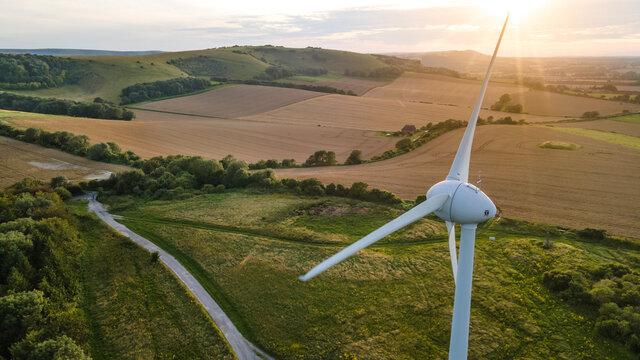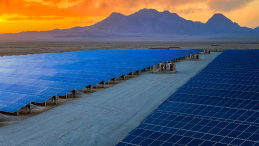RICHMOND HILL, ONTARIO, CANADA — 28 October 2025 — Investment in wind energy has generated more than £100 billion in net financial benefits for UK energy consumers between 2010 and 2023, according to a new study by Professor Mark Maslin, the Climate, Health and Security Lead at the United Nations University Institute for Water, Environment and Health (UNU-INWEH) and his colleagues.
The analysis published in UCL Open Environment reveals that wind power has significantly lowered both electricity and natural gas prices, showing that renewable energy can deliver major financial and societal returns — not just environmental ones. The analysis demonstrates that the UK’s investment in wind power reduced electricity bills by £14.2 billion and cut natural gas costs by £133.3 billion, more than offsetting £43.2 billion in subsidies paid by consumers. The result: a net saving of £104.3 billion across the energy system.
The authors argue that renewable investment should be treated as a public good, much like roads or schools, where public support yields broad and lasting benefits. The researchers used a methodological approach that contrasted the standard Short-Term Merit Order Effect (STMOE) with a new, comprehensive Long-Term Merit Order Effect (LTMOE) model. As global leaders prepare for COP30 in Brazil, the findings challenge the belief that sustainability, affordability, and energy security are incompatible — showing instead that clean energy strengthens economies and protects citizens from market volatility.
“This study shows that the UK’s investment in wind energy has paid for itself many times over,” said Maslin, who is also Professor of Earth System Science at UCL. “Renewables are not a cost — they are an investment that strengthens economies, lowers energy bills, and builds resilience. As countries plan their transitions, they must see clean energy as the smartest economic decision, not just the greenest one.”
The research used a novel long-term economic modeling to capture the overall impact of renewable energy expansion. By accounting for avoided gas infrastructure and long-term price impacts, the study provides a more accurate picture of wind power’s real value. Without the UK’s large-scale wind deployment — which grew from five to 80 terawatt hours (TWh) over the 13-year period — demand for gas would have soared, amplifying the effects of the 2022 energy crisis and driving higher consumer costs.
The study also exposes inequities in how the UK’s energy transition is financed. Currently, electricity users fund all green subsidies but receive only 18% of the financial benefits, while gas consumers — who contribute nothing to renewable subsidies — enjoy 82% of the savings through lower gas prices. The authors call for reforming subsidy and pricing systems to ensure all energy users benefit fairly from renewable investment.
"The findings send an important message to policymakers around the world: clean energy is not a financial sacrifice but a sound economic and national security strategy", said the UNU-INWEH Director, Professor Kaveh Madani. "The green transition is not an expense. It is insurance for the future. Wind energy delivers financial, environmental, and security dividends — the kind of triple win every country should aim for."
The authors emphasize that this research highlights how well-designed renewable investment can stabilize markets, reduce dependence on imported fuels, and protect economies from energy shocks. As developing nations seek ways to expand energy access while managing costs, the UK’s example shows that renewable energy can be both sustainable and economically strategic.
The lead author of study, Colm O'Shea added that viewing renewables through an investment lens — rather than as subsidies — can transform the way governments design energy policy: “Wind power boosts energy independence, lowers costs, and positions nations for long-term prosperity. This is precisely the kind of investment governments need to make if they want sustainable growth. Support for renewable energy should not be referred to as subsidies but rather high-return national investments.”
Article Information: O’Shea, C., Horne, P., & Maslin, M. (2025). Modelling the Long-Term Financial Benefits of UK Investment in Wind Energy Generation. UCL Open Environment. https://doi.org/10.14324/ucloepreprints.290.v1
UNU-INWEH Team Available for Interview
Prof. Mark Maslin – Lead, Climate, Health and Security, UNU-INWEH, mark.maslin@unu.edu
Prof. Kaveh Madani – Director, UNU-INWEH, kaveh.madani@unu.edu
About UNU-INWEH: The United Nations University Institute for Water, Environment and Health (UNU-INWEH) address critical global challenges at the intersection of water, environment, climate change, agriculture, and health. Through research, capacity development, policy engagement, and knowledge dissemination, the Institute bridges the gap between scientific evidence and the practical needs of policymakers and UN Member States, with particular attention to the Global South. Headquartered in Canada, UNU-INWEH works with a diverse range of partners, including UN agencies, governments, academia, the private sector, and civil society, to develop solutions that advance human security, resilience, and sustainability worldwide.




